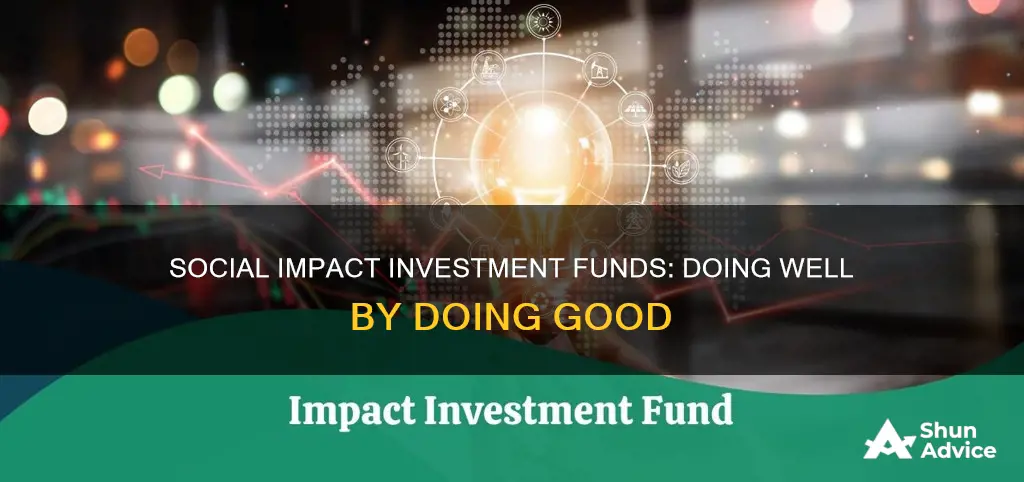
Social impact investment funds are a type of investment that seeks to generate both financial return and social or environmental impact. Impact investing is a strategy where investments are made in companies, organisations, and funds with the intention of generating a measurable, beneficial social or environmental impact, alongside a financial return. Impact investments can be made in both emerging and developed markets, targeting a range of returns. The growing impact investment market provides capital to address the world's most pressing challenges in sectors such as renewable energy, sustainable agriculture, healthcare, education, and affordable housing. Impact investing challenges the traditional view that social and environmental issues should be addressed solely by philanthropic donations, demonstrating that capital can work for more than just profit.
| Characteristics | Values | |
|---|---|---|
| Definition | Social impact investment is an approach to investing that seeks to tackle social issues, generating positive social impact alongside financial returns. | N/A |
| Targeted Organisations | Organisations or projects that have a social mission or focus, with the goal of creating positive change in the world. | N/A |
| Targeted Issues | Social issues such as poverty, inequality, or access to education or healthcare. | N/A |
| Types of Investments | Debt, equity, and hybrid models such as quasi-equity, revenue share, and social outcomes contracts. | N/A |
| Investor Types | Institutional investors like pension funds and large university endowments, charitable trusts and foundations, wealthy individuals and families, and government. | N/A |
| Dual Objectives | Financial returns and positive social or environmental outcomes. | N/A |
| Measurement of Impact | Requires the measurement and reporting of both financial performance and social/environmental results. | N/A |
| Diverse Sectors and Geographies | Renewable energy, sustainable agriculture, healthcare, education, microfinance, and affordable housing. | N/A |
| Range of Asset Classes | Venture capital, private equity, debt, and fixed income. | N/A |
What You'll Learn
- Social impact investment funds are a type of investment that seeks to generate both financial return and social or environmental impact
- These funds are a strategy where investments are made in companies, organisations, and funds with the intent to generate measurable, beneficial social or environmental impact
- Impact investing is a fast-growing category of private investing, with the market expected to grow to $1 trillion by 2025
- Social impact investment funds can be made in a variety of sectors such as renewable energy, sustainable agriculture, healthcare, education, and microfinance
- These funds are made across all asset classes, including venture capital, private equity, debt, and fixed income

Social impact investment funds are a type of investment that seeks to generate both financial return and social or environmental impact
Impact investments are made in companies, organisations, and funds with the intention of generating measurable, beneficial social or environmental outcomes, in addition to financial returns. This dual objective is a key feature of impact investing, demonstrating investors' concerns for both the venture's profitability and its positive impact on people and the planet.
The measurement of impact is a crucial aspect of social impact investment funds, requiring the assessment and reporting of both financial performance and social or environmental results. This transparency ensures accountability and reinforces the commitment to achieving dual objectives. Impact investments can be made in various sectors, including renewable energy, sustainable agriculture, healthcare, education, microfinance, and affordable housing, spanning both developed and developing countries.
The market for social impact investment funds is still relatively small but is experiencing rapid growth. In 2017, the market size was estimated at $228 billion, and it is expected to reach $1 trillion by 2025. This growth is driven by increasing interest from individuals, institutions, and governments, as well as a growing recognition that capital should work for more than just profit. Impact investing challenges the traditional view that social and environmental issues should be addressed solely through philanthropic donations.
Social impact investment funds provide an opportunity for investors to address pressing global challenges while also seeking competitive financial returns. They contribute to the growth of sectors vital for sustainable development and encourage innovation in critical social and environmental areas. However, challenges exist, including the need for standardised metrics to measure and compare the impact of investments and the perception of higher risk associated with impact investments.
UK Fund Investment: A Beginner's Guide to Getting Started
You may want to see also

These funds are a strategy where investments are made in companies, organisations, and funds with the intent to generate measurable, beneficial social or environmental impact
Social impact investment funds are a strategy where investments are made in companies, organisations, and funds with the intent to generate measurable, beneficial social or environmental impact. This approach to investing marks a shift from traditional investment strategies that focus solely on financial gains without considering the social and environmental consequences.
Impact investments are made with the intention to generate positive, measurable social and/or environmental impact alongside a financial return. These investments can be made in both emerging and developed markets, targeting a range of returns, depending on investors' strategic goals. The growing impact investment market provides capital to address the world's most pressing challenges in sectors such as renewable energy, sustainable agriculture, healthcare, education, microfinance, and affordable housing.
The key features of impact investing include dual objectives, measurement of impact, diverse sectors and geographies, and a range of asset classes. Impact investments aim to achieve both financial returns and positive social or environmental outcomes. The measurement and reporting of both financial performance and social/environmental results ensure transparency and accountability. Impact investments can be made across various sectors and geographies, including renewable energy, healthcare, education, and microfinance. Additionally, impact investing can occur across all asset classes, such as venture capital, private equity, debt, and fixed income.
The impact investing market is still relatively small but is growing rapidly. In 2017, it was estimated to be a $228 billion market, and it is expected to grow to $1 trillion by 2025. This growth is driven by increasing interest from individuals, institutions, and governments, as well as a recognition that capital can and should work for more than just profit. Impact investing offers competitive returns and contributes to the growth of sectors crucial for sustainable development, making it an attractive strategy for investors seeking both financial and social returns.
Offshore Investment Fund Setup: A Comprehensive Guide
You may want to see also

Impact investing is a fast-growing category of private investing, with the market expected to grow to $1 trillion by 2025
The growth of impact investing has been driven by increasing interest from individuals, institutions, and governments, as well as a recognition that capital can and should work for more than just profit. More investors are aware of global challenges such as climate change, inequality, and resource scarcity, and want their investments to contribute to addressing these issues. This shift in investment strategy challenges the traditional view that social and environmental issues should be addressed solely by philanthropic donations.
Impact investing firms put their money towards companies or organizations that can create a measurable societal benefit while also generating financial returns. Some of the top impact investing funds have more than $4 billion in assets under management. Examples of impact investing firms include Vital Capital, Triodos Investment Management, and the Community Reinvestment Fund, USA.
The Harvard Business School (HBS) Impact Investment Fund is another example of an initiative in the impact investing space. The fund seeks to expand access to affordable, flexible capital for entrepreneurs seeking to build businesses and drive social change. By providing capital at affordable rates, the HBS Impact Investment Fund contributes to building greater equity and diversity in business ownership.
As the impact investing market continues to grow, it is attracting a wide variety of investors, both individual and institutional. This includes development finance institutions, diversified financial institutions, banks, pension funds, insurance companies, non-governmental organizations, and religious institutions.
Investing in One Index Fund: A Smart Choice?
You may want to see also

Social impact investment funds can be made in a variety of sectors such as renewable energy, sustainable agriculture, healthcare, education, and microfinance
Social impact investment funds are a type of investment that aims to generate both financial returns and positive social or environmental outcomes. These investments can be made in a wide range of sectors, including renewable energy, sustainable agriculture, healthcare, education, and microfinance.
Renewable Energy
Impact investors are increasingly focusing on renewable energy projects as a way to reduce reliance on fossil fuels and combat climate change. This includes investing in solar or wind farms, as well as companies developing innovative clean technologies and solutions for energy efficiency.
Sustainable Agriculture
The sustainable agriculture sector is attracting significant attention from impact investors due to its potential to enhance food security, promote organic farming practices, and reduce the environmental impact of agriculture. Impact investment in this sector has been growing at an impressive rate, with capital being deployed to support ranchers transitioning to grass-fed beef production, connecting small farms to communities, and converting farmland to organic and regenerative systems.
Healthcare
In the healthcare sector, impact investments are being made to improve access to quality healthcare services, particularly in underserved regions and low-income communities. This includes investing in healthcare startups, infrastructure projects, and social impact bonds that fund social programs aiming to achieve specific health-related outcomes.
Education
Impact investing in education focuses on initiatives that improve access to quality education and skill development, especially in disadvantaged communities. This can take the form of investing in schools, vocational training programs, or educational technology platforms. A unique example of impact investing in education is a pilot program in India, where loans are provided to low-fee private schools with financial incentives tied to improvements in student learning outcomes.
Microfinance
Microfinance institutions (MFIs) are another key area of focus for social impact investment funds. These institutions provide financial services such as small loans and savings accounts to entrepreneurs and individuals in underserved communities. Impact investors support MFIs with the dual objectives of generating financial returns and empowering individuals to start or grow their businesses.
Closed-End Investment Funds: Where and How to Trade
You may want to see also

These funds are made across all asset classes, including venture capital, private equity, debt, and fixed income
Social impact investment funds are made with the intention of generating measurable, beneficial social and/or environmental impacts alongside financial returns. These funds are made across all asset classes, including venture capital, private equity, debt, and fixed income.
Venture capital and private equity are both types of investments where money is invested in businesses with strong growth potential. Venture capital typically involves investing in early-stage and emerging companies, while private equity involves investing in more mature companies. Both types of investments can be used to support social impact initiatives by targeting companies that have a positive social or environmental impact.
Debt as an asset class refers to investments in bonds or loans, where the investor lends money to a company or government in exchange for regular interest payments. Social impact investment funds that focus on debt may invest in bonds or provide loans to companies or organizations that have a positive social or environmental impact.
Fixed income is an investment that pays a fixed amount at regular intervals. This can include investments in bonds, preferred stocks, or money market instruments. Social impact investment funds that focus on fixed income may invest in these types of instruments issued by companies or organizations with a social or environmental mission.
Overall, social impact investment funds that are made across these asset classes can help to address pressing global challenges while also providing financial returns for investors.
Mutual Funds in India: Safe Investment or Risky Business?
You may want to see also
Frequently asked questions
A social impact investment fund is a type of investment fund that seeks to generate both financial returns and measurable, positive social or environmental impacts. These funds target a range of sectors, including renewable energy, sustainable agriculture, healthcare, education, and affordable housing.
An example of a social impact investment fund is the Harvard Business School (HBS) Impact Investment Fund, which seeks to expand access to affordable, flexible capital for entrepreneurs aiming to drive social change and generate reasonable investment returns.
Social impact investment funds provide capital to address pressing global challenges and contribute to the growth of sectors crucial for sustainable development. They encourage innovation in areas critical for social and environmental progress and promote the consideration of social and environmental consequences in investment decisions.
To get started with social impact investment funds, individuals can consider researching and identifying funds that align with their values and investment goals. They can also seek out financial advisors or impact investing platforms that specialize in this area to guide their investment decisions and provide access to suitable investment opportunities.







